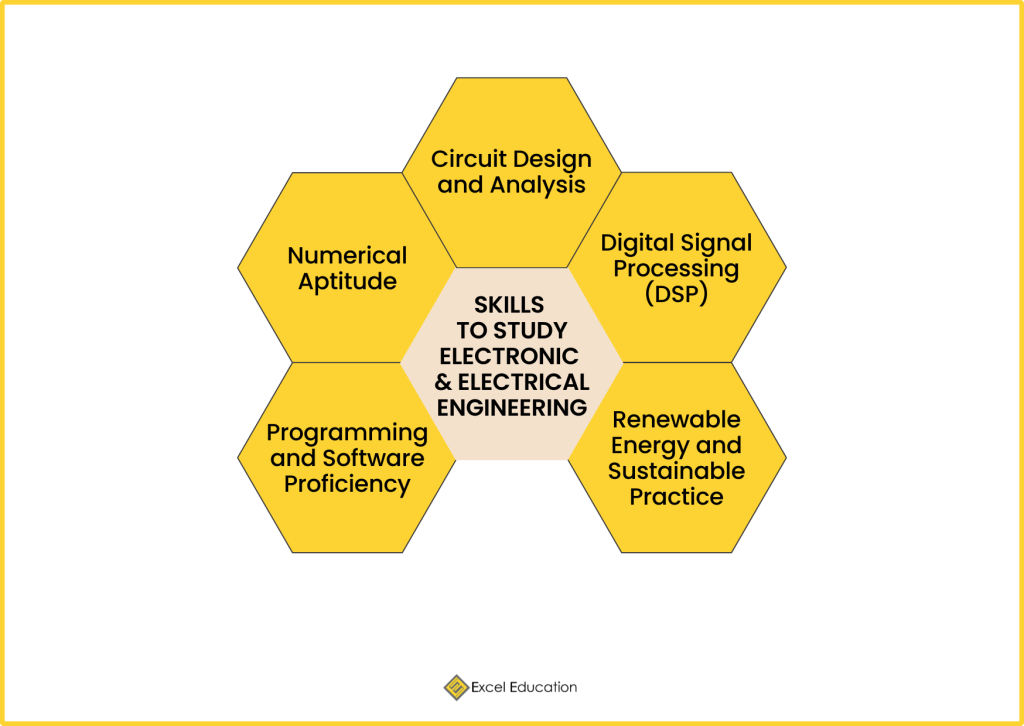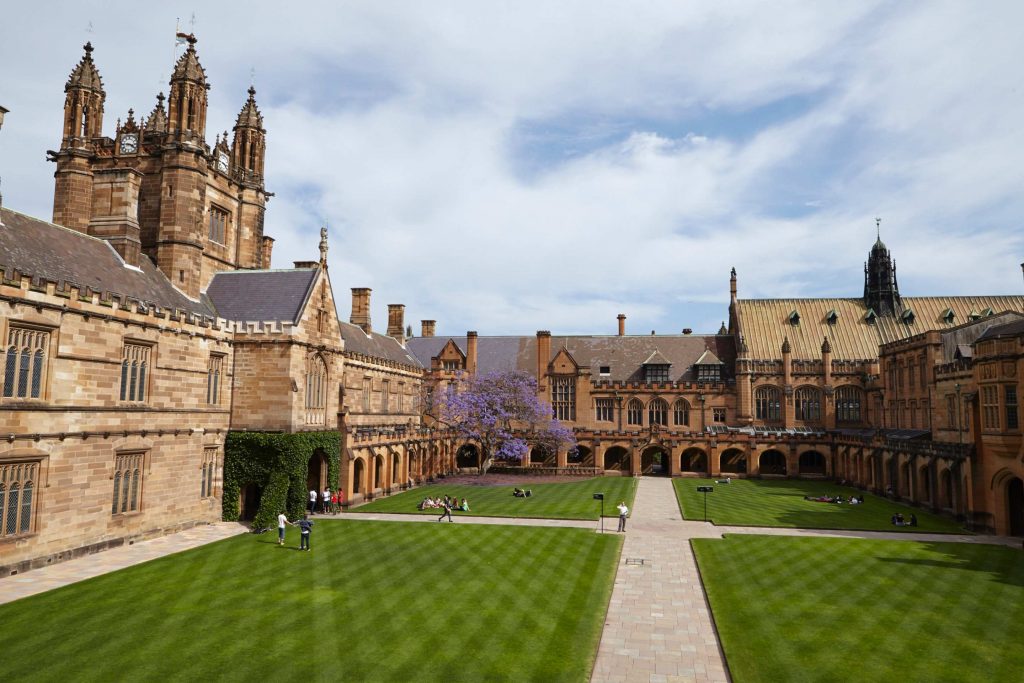
Looking for a specialisation of Engineering which incorporates how electrical devices work or how electrical energy is produced and used? Perhaps Electrical and Electronic Engineering is for you! Let’s discover the ins and outs of Electrical & Electronic Engineering (EEE) Degree in Australia.
What is Electrical and Electronic Engineering?

Electrical and Electronic Engineering covers a wide range of electricity or electromagnetic related Engineering. It is a combination of both Electrical and Electronic Engineering.
- Electrical Engineering: focuses on power systems, electrical machinery, and energy generation. Examples of Electrical Engineering include: power grid design, energy distribution, and renewable energy.
- Electronic Engineering: focuses on electronic circuits, integrated circuits, microprocessors, and communication systems. Examples of Electronic Engineering include: the design of consumer electronics, telecommunications devices, and control systems.
The field of Electrical and Electronic Engineering allows one to be at the forefront of future emerging technologies. Knowing that technology is a huge driver of change and its immense impact on society, the field is definitely fast-growing with a promising future.
Electrical and Electronic Engineering (EEE) is also closely related to Electronics and Communication Engineering (ECE). However, the latter centres more on communicative devices and broadcast systems.
What do Electronic and Electrical Engineers do?

Generally, Electronic and Electrical Engineers are responsible for designing, developing, testing, improving, and monitoring the manufacture of electrical equipment. Accordingly, the fields Electronic and Electrical Engineers can venture into are vast with varied tasks. Their responsibilities can include:
1. Exploring new technology – Electronic and Electrical Engineers explore new technology, systems, or components from the stage of research and development up to the final supervision. These technologies could be meant for advancing automation, communication systems, radar, or basically almost everything involving electricity and electromagnetism.
2. Developing industrial strategies – With rapid technological growth, comes rapid revolution in digital information and consumer insights. In this case, Electronic and Electrical Engineers can analyse consumer needs, evaluate issues, and recommend solutions while working with other professionals.
3. Finding sustainable solutions for energy or transport – Sustainability has been big across industries, Electronic and Electrical Engineering included. This aligns with improving developed technology and also ensuring they meet safety standards and regulations.
4. Solving challenging Engineering problems – The field of Electronic and Electrical Engineering is dynamic with changes happening rapidly each passing day. Hence, Electronic and Electrical Engineers are responsible in designing new ways to electrical power to develop and improve products.
5. Understanding how to design systems – This responsibility is fundamental to the field of Electronic and Electrical Engineering, where Engineering professionals of the field should be knowledgeable of materials used up to circuit architecture and system hardware, enough so that they can explain the significance of these components in layman terms. This is especially necessary because they are likely to collaborate with those of a non-Engineering background.
Skills Required to Study Electronic and Electrical Engineering

- Circuit Design and Analysis
One major component of Electronic and Electrical Engineering is to understand the principles of designing and analysing electrical circuits. This skill is necessary for knowledge on creating safe electrical systems and also to construct and repair electrical equipment.
- Numerical Aptitude
In Electronic and Electrical Engineering study programmes (moreso, Engineering programmes generally), Mathematics is deeply integrated. This means that students will most definitely undertake more advanced Mathematics subjects and Physics as well. That’s why, numerical aptitude will substantially help you breeze through the programme.
- Digital Signal Processing (DSP)
Digital Signal Processing is a process where signals like voice, video, temperature, or pressure are digitised and then mathematically manipulated. DSP is present in many digital, communication, and electrical systems. An instance of DSP is the playback of recorded music on electronic devices.
- Programming and Software Proficiency
Electronic and Electrical Engineering programme will incorporate the utilisation of softwares, where students will have to learn programming languages. As such, programming and software proficiency will aid in studying Electronic and Electrical Engineering but remember, you can always learn and improve as you go.
- Renewable Energy and Sustainable Practice
With growing awareness on the importance of sustainability, knowledge on renewable energy sources and its integration as well as efficient-energy practices is essential. This skill is crucial in the transition to reduce carbon footprint and utilise cleaner sources of energy.
Career Options for Electrical and Electronic Engineer Graduates
Some career options Electrical and Electronic Engineer graduates can venture into include:
- Electrical and Electronic Engineer
- Electrical Power Engineer
- Power Systems Engineer
- Systems Engineer
- Telecommunications Equipment Engineer
- Electrical Design Engineer
- Automatic Control Systems Engineer
- Robotics Engineer
- Biomedical Instrumentation Engineer
- Renewable Energy Systems Engineer
The average annual salary for an Electrical Engineer in Australia ranges from AU$110,000 to AU$130,000
The average annual salary for an Electronic Engineer in Australia ranges from AU$85,000 to AU$105,000.
Salaries can vary depending on which state you plan to work in.
How to be an Electrical Engineer in Australia

1. Complete SPM or equivalent examinations
The initial step for your journey into becoming an Electrical Engineer is to complete high school qualifications which could be through any SPM or equivalent examination. It could greatly benefit future applications if you have taken Additional Mathematics or Physics subjects.
2. Complete relevant pre-university qualifications
After, enrol and complete relevant pre-university study programmes which will qualify you into a Bachelor of Engineering programme in Australia. An alternative route would be to enrol in a Diploma of Engineering in Australia, which could take up from 8-12 months. This alternative route would enable you to gain entry to the second year of a Bachelor of Engineering programme in Australia. However, this is highly dependent on your scores and the institution you are enrolled in.
3. Enrol in an accredited Bachelor of Engineering programme
Next, enrol in an accredited Bachelor of Engineering programme majoring in Electrical Engineering or majoring in Electrical and Electronic Engineering. This step could take up to 4 years. Though, with a Diploma of Engineering, this step would take up 3 years. Accreditations for the Bachelor of Engineering programme in Australia are typically granted by Engineers Australia (EA).
4. Obtain additional qualifications
Completion of your Bachelors would allow for you to work as a Graduate Engineer. Here, you can gain professional experience for 3-5 years and/or enrol in postgraduate programmes in specific Engineering specialisation to gain more credentials before being able to become established Electrical Engineers.
5. Secure Licensing
However, to be able to work as an Electrical Engineer you would need a licensing. Depending on the Australian region you plan to work in, it may be a different process. Regardless, you can obtain the National Engineering Registration (NER) credential from Engineers Australia to become a legally recognised Electrical Engineer.
One road to Permanent Residency (PR) in Australia is through occupation as an Electrical Engineer. Electrical Engineers are typically under the Medium and Long-term Strategic Skills List (MLTSSL) where an occupation is projected to be in demand for medium to long term duration. Electrical Engineers under MLTSSL have the opportunity for migration to Australia such as via the subclass 494 (Skilled Employer Sponsored Regional (Provisional) visa. Keep in mind there are other visa subclasses that you may apply for.
When you are eligible to apply for permanent residency, you can apply for permanent resident visa such as subclass 190 (Skilled Nominated) visa. The choice of visa may vary from occupation, eligibility, regional preference, and wish to acquire permanent residence.
General Entry Requirements to Study Electrical and Electronic Engineering
Academic Entry
Do take note that most Electrical and Electronic Engineering programmes have a Mathematics subject prerequisite. Some would also require a Science subject prerequisite.
Academic Entry | Minimum Score |
STPM | GPA 2.70 |
Matriculation | CGPA 2.60 |
A-Levels | Aggregate of 7 in the Best 3 Subjects |
UEC | Aggregate of 15 in the Best 5 Subjects |
IB Diploma | 28 |
Australian Matriculation (ATAR) | 70 |
Canadian Pre-University (CPU) | 67.5% |
Note: Universities may have different requirements. To learn more, get in touch with us!
English Language Entry Requirements
Entry Level | Minimum Score |
IELTS | 6.5 |
TOEFL | 79 |
Pearson Test of English (PTE) | 58 |
Note: Universities may have different requirements. To learn more, get in touch with us!
Top Universities to Study Electrical and Electronic Engineering in Australia
1. University of Sydney (USYD)

The University of Sydney, known as USYD, was founded in 1850. USYD is the oldest university in Australia, presented through its sandstone exterior. The university was ranked 19th among universities globally in 2024 and is also a member of the Group of Eight (Go8) network, making it an excellent study destination choice.
The Bachelor of Engineering Honours (Electrical Engineering) programme by the University of Sydney offers a comprehensive Engineering education complete with foundational core theories as well as professional engagement activities throughout the programme. Also, the programme is accredited by Engineers Australia and other major professional Engineering institutions.
Programme Offered | Bachelor of Engineering Honours (Electrical Engineering) |
Duration | 4 Years |
Intake | February, July |
Indicative Fees (2024) | International Students: AU$224,000 |
Contact us right now for a free consultation if you’d like more details about the costs, the format of the programme, and the entry requirements!
2. University Technology of Sydney (UTS)

The University of Technology Sydney, referred to as UTS, is a renowned public university in Australia with history traced back to 1870. UTS is ranked among the top 100 of universities worldwide, marking their academic prominence and global impact.
The University of Technology Sydney’s Bachelor of Engineering (Honours) programme allows for prospective students to major in Electrical and Electronic Engineering where they will be permitted placement practice opportunities alongside their studies. The programme is also provisionally accredited with Engineers Australia ensuring graduates acquire practical skills in hardware and software for designing, developing, and controlling IoT devices and energy systems.
Programme Offered | Bachelor of Engineering (Honours) Major in:
|
Duration | 4 Years |
Intake | February, July |
Indicative Fees (2024) | International Students: AU$216,612 |
Contact us right now for a free consultation if you’d like more details about the costs, the format of the programme, and the entry requirements!
3.University of Western Australia (UWA)

The University of Western Australia, abbreviated as UWA, is a distinguished public higher education learning institution inaugurated in 1911. The University of Western Australia is ranked among the top 10 of universities in Australia in the year 2024.
The Bachelor of Engineering (Honours) offered by the University of Western Australia enables prospective students to major in Electrical and Electronic Engineering which concentrates on a hands-on approach towards learning. Students also have opportunities for making valuable industry connections, access to modern facilities, and an integrated industrial practice alongside a provisionally accredited Engineering curriculum.
Programme Offered | Bachelor of Engineering (Honours) Major in:
|
Duration | 4 Years |
Intake | February, July |
Indicative Fees (2024) | International Students: AU$192,800 |
Contact us right now for a free consultation if you’d like more details about the costs, the format of the programme, and the entry requirements!
4. Griffith University

Griffith University is a public research university established in 1971 with five campuses throughout Australia. Griffith is known for their diverse student community as well as their academic prominence based on their place in the top 20 among universities in Australia for the year of 2024.
Griffith University’s Bachelor of Engineering (Honours) programme embeds an option where prospective students can major in Electrical and Electronic Engineering. In Griffith’s Engineering programme, students can expect hands-on industry experience, purpose-built facilities, accredited Engineering syllabus, as well as global exchange opportunities, to support learning, growth, and employability.
Programme Offered | Bachelor of Engineering (Honours) Major in:
|
Duration | 4 Years |
Intake | March, July |
Indicative Fees (2024) | International Students: AU$166,000 |
Contact us right now for a free consultation if you’d like more details about the costs, the format of the programme, and the entry requirements!
5. Deakin University

Deakin University, initiated in 1974, is a public tertiary education learning institution named after Australia’s second prime minister, Alfred Deakin. Deakin is a compelling study destination choice considering their ranks in the top 20 amongst Australian universities as well as their dedication to academic excellence. For a comparatively affordable Electrical and Electronic Engineering programme, Deakin University might be the answer you are looking for.
The accredited Bachelor of Engineering (Honours) with a major in Electrical and Electronics Engineering programme by Deakin ensures graduates are equipped with technical knowledge and practical skills to generate innovative solutions to real-world Engineering problems. Students will also be able to participate in industry-informed projects and experience project-based learning in Deakin’s state-of-the-art lab spaces.
Programme Offered | Bachelor of Engineering (Honours) Major in:
|
Duration | 4 Years |
Intake | March, July |
Indicative Fees (2024) | International Students: AU$163,200 |
Contact us right now for a free consultation if you’d like more details about the costs, the format of the programme, and the entry requirements!
For more information regarding the university, programme offered, entry requirements and fees, contact Excel Education.
About The Author

Hannah Hir
Hannah appreciates various art forms, especially Asian literature, film and music. Most of her favorite Malaysian kuihs are green-coloured.

